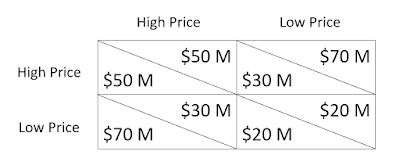Discuss whether an oligopolistic firm should collude rather than compete. [15 marks]
The given question is question 2.(b) from the November 2018 Economics Paper 1. N18/3/ECONO/HP1/ENG/TZ0/XX . For Question 2. (a), click here.
As mentioned in the answer for 2. (a), oligopolistic firms that collude benefit from higher profits and are more likely to continually earn abnormal profits in the long run too. Collusion grants firms many of the advantages that monopolies gain from as all firms act as one party.
Firstly, with higher profits, they can invest in R&D to produce better/ greener technology and increase efficiency of production. This will not only reduce negative externalities in the long run but also increase the firms’ economies of scale. As big firms, oligopolies can benefit from various economies, for instance, managerial (as they hire better managers), purchasing (as they get discounts on bulk buying), financial (lower interest on loans), etc.
However, the higher price for products mean that consumers cannot enjoy the benefits of lower costs. Also, it is possible that firms may not take advantage of lower cost of production and will have X-inefficiency given that they have very less competition as shown in the diagram below.
Less
competition means firms may be careless about cost of production which may be
higher than necessary. In the diagram, it is X whereas it could be a lower
point on the ATC. This would lead to higher productive and allocative inefficiency. Moreover, consumers are at a risk of abusive monopoly power
that colluded oligopolies hold. In many countries, collusion or forming of
cartels is illegal, however, firms may knowingly collude and try to hide from
the law which protects consumers.
For the
members of oligopoly, there remain some disadvantages too. If the oligopoly is
too large, many disagreements may arise thus easily breaking the oligopoly.
Similarly, if a firm has a higher cost of production, they may demand a higher
price, again leading to disputes. Lastly, all firms run the risk of prisoner’s dilemma
as discussed in 2. (a). If any one of them starts, it may lead to price wars as
firms keep reducing their prices which may extend into losses.
Tacit collusion
in the form of limit pricing may moreover create high barriers to entry which may
lead to higher opportunity costs such as greater competition leading to better
products and even the opportunity for greater number of jobs.
Given the
above conditions, while collusion may seem to have great advantages for firms,
it may not necessarily exceed the risk of prisoner’s dilemma, especially in
times of recession when firms are more likely to cheat, and the risk of being
legally penalised for abusive monopoly power. Although, such legal rules do not
apply internationally, for example the Organisation of Petroleum Exporting
Countries (OPEC) can function openly, it is still prone to cheating, which is
why very less oligopolies exist.




This comment has been removed by a blog administrator.
ReplyDelete